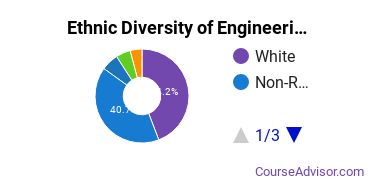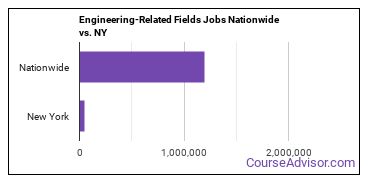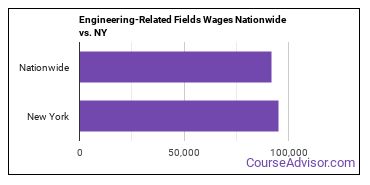Engineering-Related Fields Schools in New York
In 2022-2023, 1,001 students earned their Engineering-Related Fields degrees in NY.
In this state, Engineering-Related Fields is the 95th most popular major out of a total 336 majors commonly available.
Education Levels of Engineering-Related Fields Majors in New York
Engineering-Related Fields majors in the state tend to have the following degree levels:
| Education Level | Number of Grads |
|---|---|
| Master’s Degree | 684 |
| Bachelor’s Degree | 316 |
| Doctor’s Degree (Research / Scholarship) | 1 |
| Doctor’s Degree (Professional Practice) | 1 |
| Doctor’s Degree (Other) | 1 |
Gender Distribution
In New York, a engineering-related fields major is more popular with men than with women.

Racial Distribution
The racial distribution of engineering-related fields majors in New York is as follows:
- Asian: 9.1%
- Black or African American: 5.1%
- Hispanic or Latino: 6.0%
- White: 30.7%
- Non-Resident Alien: 45.1%
- Other Races: 4.1%

Jobs for Engineering-Related Fields Grads in New York
In this state, there are 46,260 people employed in jobs related to an engineering-related fields degree, compared to 1,195,560 nationwide.

Wages for Engineering-Related Fields Jobs in New York
In this state, engineering-related fields grads earn an average of $95,270. Nationwide, they make an average of $91,630.

Most Popular Engineering-Related Fields Programs in NY
There are 10 colleges in New York that offer engineering-related fields degrees. Learn about the most popular 10 below:
8 to 1 is the student to faculty ratio. Of all the students who attend this school, 53% get financial aid. Most students complete their degree in 4.13 years.
Request InformationThis private school has an average net price of $31,114. 96% of the teachers are full time. 14 to 1 is the student to faculty ratio.
Request Information23 to 1 is the student to faculty ratio.
Request Information99% of students are awarded financial aid at this school. The average student takes 4.76 years to complete their degree at RIT. The student to faculty ratio is 13 to 1.
Request InformationIt takes the average student 4.07 years to graduate. 100% of the teachers are full time. Students enjoy a student to faculty ratio of 7 to 1.
Request Information59% of students get financical aid. Of all the teachers who work at the school, 91% are considered full time. This private school has an average net price of $29,651.
Request Information79% of students are awarded financial aid at this school. It takes the average student 4.14 years to graduate. This private school has an average net price of $36,889.
Request InformationThe student to faculty ratio is 13 to 1. An average student at Hofstra will pay a net price of $34,152. 99% of students are awarded financial aid at this school.
Request Information99% of students are awarded financial aid at this school. Most students complete their degree in 4.46 years. An average student at NYIT will pay a net price of $20,437.
Request InformationThis public college charges it's students an average net price of $14,559. The average student takes 4.21 years to complete their degree at SUNY Canton. The student to faculty ratio is 18 to 1.
Request InformationEngineering-Related Fields Careers in NY
Some of the careers engineering-related fields majors go into include:
| Job Title | NY Job Growth | NY Median Salary |
|---|---|---|
| Architectural and Engineering Managers | 10% | $151,150 |
| Industrial Engineering Technicians | 8% | $56,150 |
Related Majors in New York
Below are some popular majors in the state that are similar to engineering-related fields.
| Major | Annual Graduates in NY |
|---|---|
| Mechanical Engineering | 711 |
| Electronics Engineering | 521 |
| Computer Engineering | 402 |
| Electromechanical Engineering | 289 |
| Construction Engineering | 254 |
| Civil Engineering | 187 |
| Drafting & Design Engineering | 156 |
| Nuclear Engineering | 149 |
View all majors related to Engineering-Related Fields
Explore Major by State
Alabama
Arkansas
Connecticut
Florida
Idaho
Iowa
Louisiana
Massachusetts
Mississippi
Nebraska
New Jersey
North Carolina
Oklahoma
Rhode Island
Tennessee
Vermont
West Virginia
View Nationwide Engineering-Related Fields Report
References
More about our data sources and methodologies.










